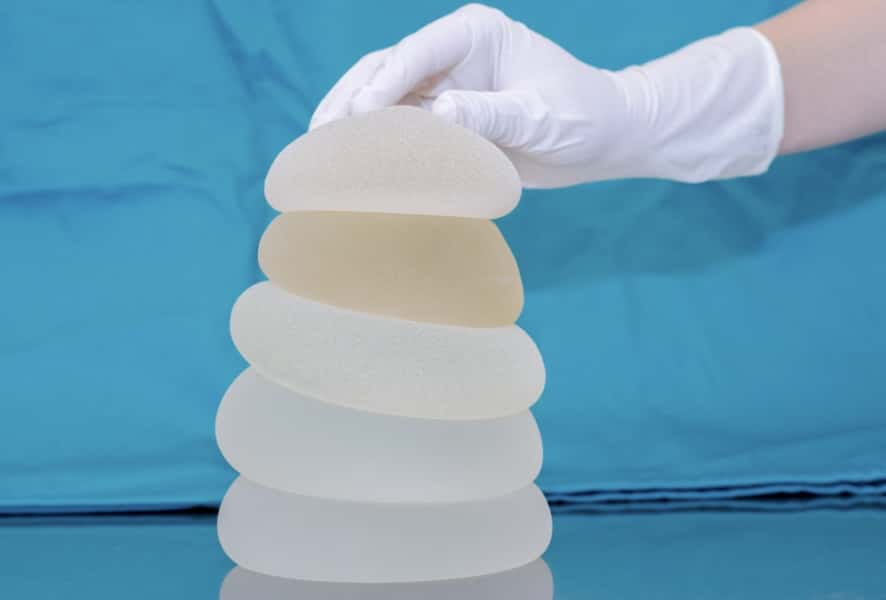
In 2012, there was much hype about the latest different types of breast augmentation implant devices to receive FDA approval: the highly cohesive, form-stable “gummy bear” breast implants. Named for its resemblance to the candies, these new silicone breast implants do not leak when cut or punctured and, therefore, have a lower risk of rupture.
Since saline and previous versions of silicone implants are still widely used for breast implant surgery and deemed safe by the FDA, many people wonder if today’s breast implants have improved. Newer models are extremely durable when compared to previous models.
HOW COMMON IS IMPLANT RUPTURE?
Research published in Archives of Plastic Surgery in 2014 found that the age of the implants definitely has an impact on their likelihood of rupture. Rupture/deflation rates of 3 to 5 percent occurred in saline breast implants 3 years after insertion, and after 10 years, the rates went up to 7 to 10 percent.
While saline implants are more likely to rupture than the previous-generation silicone implants, saline implant ruptures are safely absorbed by the body as it is a sterile saltwater solution.
They are also much easier to detect than silicone implant ruptures because the patient will notice the obvious deflation of the ruptured saline implant. This earlier detection typically leads to fewer complications.
Research on the rupture rate of the latest “gummy bear” implants (manufactured by Sientra) is still in process. Data is being collected from the 1,788 participants involved in the pre-market study for 2 more years.
A 10-year study is also in motion, involving 4,782 women who have received the implants, to determine the likelihood of long-term complications.
However, MENTOR® MemoryGel® silicon implants, a version of silicone cohesive gel implants that are almost as form-stable as Sientra’s version, determined only a 1.1 percent risk of rupture after 6 years.
SHOULD I BE CONCERNED?
Breast implants, both saline implants and silicon implants can maintain their safe functionality within the body for decades, but patients should know that ever breast implant is considered a semi-permanent device not lifetime devices.
Anyone considering a breast augmentation surgery with or without a breast lift should be prepared for revision breast surgery in the future, whether due to breast implant size, breast tissue complications, adverse events, abnormal cosmetic changes, or the desire to modify because their breast aesthetics have changed with age.
MRI screenings are the most effective method for detecting ruptures, especially “silent ruptures” that can occur with silicone gel implants. A silent rupture can be detected early with this imaging technology. An MRI is recommended 3 years after augmentation with silicone implants and every other year afterward.
If rupture occurs, the implant material will not cause immediate harm to the body, but the fibrous tissue may become inflamed and lead to other complications. Breast implant revision surgery will replace the implants and restore the health and aesthetics of the breasts.
 WHEN DOES RUPTURE OCCUR?
WHEN DOES RUPTURE OCCUR?
The reported causes of breast implant rupture are considered “spontaneous” and include iatrogenic damage, trauma, chemical degradation of the implant shell, and pressure during mammography. As noted in the statistics above, these occurrences are rare.
While it is true that a breast implant might actually explode at high altitudes or in low air pressure, as explored in an October 2003 episode of Myth Busters, these conditions would have to be so extreme that the person would die before the implants themselves would be damaged.
The same goes for extreme temperatures; the conditions would have to become unsustainable for human life long before the implants would be affected. Breast augmentation patients have no need to be concerned that their implants will rupture when flying, undergoing hyperbaric therapy, or enduring the extreme cold.
Questions and Answers
How long do breast implants last?
Breast implants last for a lengthy time but do not last forever, but they also don’t come with an expiration date. Silicone implants or saline implants typically last between 10 to 15 years before they need to be replaced.
Within an average lifespan of around 10 years 20% of women have had revision surgery such as a breast implant removal or breast implant replacement.
What happens to breast implants after 20 years?
Contemporary implants are engineered for a lifespan exceeding a decade, with the likelihood of rupture growing by one percent annually. the longer your implants have been in place, the higher the risk of potential issues such as rupture.
It’s worth noting that in numerous instances, breast implants can maintain their integrity and functionality for 20 years or even longer.
How long do breast implants stay hard?
As the breast pocket gradually expands during the “fluff” process, your breast implants will naturally undergo a softening process, typically noticeable around six months post-surgery. It’s essential to remember, however, that individual experiences may vary among women.
What is capsular contracture and what causes it?
The introduction of a foreign object into the body can trigger an immune system response, potentially leading to capsular contracture.
As the immune system heightens its activity against foreign entities, it may induce an inflammatory reaction that is associated with breast hardening or hardened scar tissue, particularly in the vicinity of medical implants or other foreign objects, like a breast implant.
What factors determine how long breast implants last?
Many factors can influence how long your implants last. A qualified plastic surgeon can effect how long breast implants will endure but there are other factors of importance as well to be considered.
The physiology differs as all patients are unique individuals with different tissue characteristics, healing times, and body acceptance. Most patients who undergo breast augmentation will not have any problems following their surgery, but some may experience cosmetic abnormalities in one or both implants.
What is the best way to prolong the lifespan of my implants?
Proper care following your breast augmentation can increase the average lifespan of your new additions. Plastic surgeons will detail a plan for you following your procedure.
Overall health is always important. Maintaining a healthy lifestyle, preventing weight gain by staying in good shape, avoiding extreme changes to your body, and attending annual checkups will also play a huge role.
Schedule a Consultation Today
If you are interested in learning more about the safety and effectiveness of breast augmentation and the differences between saline and silicone breast implants, and how long these breast implants last, please schedule an initial consultation at Galanis Plastic Surgery with board certified plastic surgeon Charles Galanis, M.D. Call our Beverly Hills office at (310) 858.8930 today.


